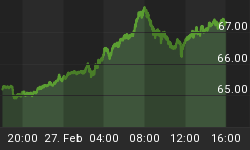Bloomberg reports China Ends 25-Year Wait as Yuan Oil Futures Set to Start Trading.
In a challenge to the world’s dollar-denominated oil benchmarks Brent and West Texas Intermediate, China will list local-currency crude futures in Shanghai on March 26, according to the nation’s securities regulator. The start of trading, open to foreigners, will mark the end of years of delays and setbacks since China’s first attempt at a domestic contract in 1993.
If the futures are embraced by overseas investors and become a benchmark for global oil transactions, China’s hoping the yuan could threaten the dominance of the greenback in international trade. But skeptics say that will never happen as long as the currency is controlled by the central government, and while international traders may agree to settle contracts converted into yuan, they’ll continue to price the oil in dollars.
China surpassed the U.S. as the world’s biggest oil importer last year, buying about 8.43 million barrels a day to feed demand from government-run as well as independent refiners. The nation has also been hoarding million of barrels for its Strategic Petroleum Reserve. Rather than buying how much ever crude they want, private companies have to adhere to government-issues quotas for their purchases. And this year such allocations expanded.
The move toward creating a so-called “petro-yuan” will be a “huge story,” Adam Levinson, the founder and chief investment officer of Graticule Asset Management Asia, said in October. Besides serving as a hedging tool for Chinese companies, the contract will aid the broader government agenda of increasing the use of the yuan in trade settlement, he said.
End of the Dollar?
Don't be silly. For starters, it is meaningless what oil is priced in. It makes no difference, outside of something illiquid like Yap Island stones, what any commodity is priced in. Conversion is instantaneous.
Reserve Currency Math
It does matter where countries hold their reserves. China wants the yuan to play a bigger role in international trade. That's easy enough to achieve, at least on paper. All China has to do is run huge trade deficits and other countries will hold yuan as a mathematical necessity.
The corollary is that as long as the US runs huge trade deficits, it a mathematical necessity that the trade surplus countries accumulate dollar-denominated assets, typically US treasuries.
End of the Petro-Dollar?
Is this end of the petro-dollar in the Mideast? Actually, yes. But the Yuan has nothing to do with it.
US Petroleum Imports
US Net Imports
The above charts are from a US Energy Information Agency (EIA) Bulletin from May 8, 2017.
Let's now consider a couple of charts from the EIA Annual Energy Outlook 2018 report released on February 6, 2018.
US Net Petroleum Exporter
In all but extreme cases, the EIA expects the US to be a net exporter of energy within 3-5 years.
US Crude Production
If the US no longer runs trade deficits with the Mideast, they no longer need to accumulate US dollar reserves.
China is now the biggest importer of crude in the world. If China starts running perpetual trade deficits with OPEC countries, it makes sense for OPEC to hold Yuan reserves as long as the OPEC countries trust the yuan.
Wrong Picture
The Bloomberg article has the picture wrong. The story has nothing to do with challenging dollar benchmarks. The pricing unit is irrelevant.
Rather, the importance of OPEC on the US is waning which is a good thing!
By Mike "Mish" Shedlock



















